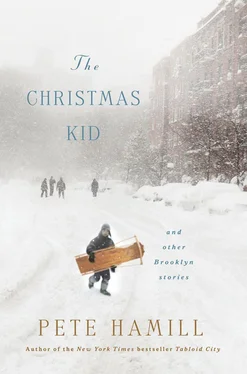His eyes were now blank. His body sagged. The gun hand hung straight at his side. He looked at Devlin as if he’d never seen him before, and then turned around and walked to the door, shoving the gun into his side pocket, and went out into the night.
“What the hell…” Loftus said. The two old men hurried to the door and left without a word. Loftus looked at the smashed mirror and started straightening the bottles.
“That guy should be in a nuthouse,” Loftus said.
“Give me a dime, George,” Devlin said. “That bum shouldn’t be walking the streets with a gun.”
“I don’t have any dimes,” Loftus said. “I don’t have any nickels, either. The change is all gone. Go home, Liam.”
Devlin went out. The wind was driving harder off the harbor. He went home for a while and then decided he couldn’t sleep while Parker roamed the streets. He dressed again and walked to the precinct house, ten blocks away, his face frozen, his feet without feeling, the soft swollen patch on his skull beginning to throb. He hurried up the steps of the precinct house. He stopped at the desk and explained to the desk sergeant that he wanted to file a complaint against a cop. A cop named Jack Parker.
The sergeant looked at some papers. “Jack Parker? Forget it, sport. You’re too late. They just found him on his wife’s stoop, up there by the park. With a hole in his head.” He shook his head sadly. “Seems like he eighty-sixed himself.”
Devlin bounced a fist off the rail in front of the desk.
“That bum,” he said. “He really did have trouble.”
“The worst trouble of all, sport.”
IT WASN’T A GOOD idea. Laverty was sure of that. But the girl had insisted, telling him that she couldn’t have this New York week before college without seeing the place where he’d grown up. She could never go alone, she said, and she didn’t know when they’d ever be together in New York again, and, so, after more of this, Laverty had agreed.
Now she was beside him in the rented car, three thousand miles from the house on the hill in Laguna; far from bougainvillea and surfboard summers and horse trails on the Irvine Ranch; far from the great blue lake of the Pacific. She was beside him, the map unfolded in her lap, her blond hair tossed by the river wind, and they were crossing the Brooklyn Bridge on a clear fall day and he was filled with dread.
“Now, this must be the East River, right under us,” she said brightly. “Right, Dad?”
“Right. Except I’m not sure it’s a river. I’ve read that it’s an estuary but I’ve also read that it has been cut through at the top, and that makes it a real river. All I know is the water goes uptown and downtown at the same time.”
“Amazing. And your house? Which way is it?”
“Away up there to the right. Where the green is.”
He came down off the bridge, trying to get his bearings; there were government buildings on his right, new and ugly, and over to the left was Fulton Street, where the A&S department store was and Loew’s Met and past them the Duffield and the RKO Albee and the Brooklyn Paramount and the Fox. They were probably all gone now; movie houses were vanishing all over the country, taking the balcony girls with them and the matrons and the gaudy dreams that filled the darkness. Namm’s used to be down there somewhere, and Loeser’s, too; I haven’t pictured those stores in twenty-five years, Laverty thought. And remembered long aisles stacked with clothing, the elegant lettering on the Loeser’s sign, the forbidden whisperings of the lingerie department, the sound of women’s high heels on hardwood floors. And American Indians, all ironworkers, drinking around the corner in a place called the Wigwam.
The dread seeped through him anew. He had seen the photographs in the magazines, the documentaries on TV, showing the desolation of the Bronx and Brownsville, places where people like Laverty once had lived the plenitude of youth. He had long since imagined his neighborhood consumed by the summer fires. And he didn’t really want to see the ruins.
“Now, what’s that thing?” his daughter asked as they stopped at a light. He looked up at a huge glass-brick building on the corner of Atlantic Avenue. “I don’t really know,” he said, “but it’s sure as hell ugly.” And then she said, “Oh, it’s a jail . Look, it has bars, and cops outside, and all those women waiting on line to get in. It’s a jail, Dad!”
“You’re right,” he said, and remembered the time Shorty and Lahr were arrested for stealing a Pontiac, and everybody in the crowd went to the jail on Raymond Street and waited until they were released on bail; and how they’d all gone down to Coney Island that night to celebrate and they got drunk and started fighting with some South Brooklyn boys in a joint called McCabe’s and Laverty woke up with skinned knuckles and no memory and knew that he wasn’t going to live like this very much longer.
He remembered leaves burning everywhere that fall, in the yards of that neighborhood; and how when the other guys started to leave for the army, or for jail, or for swift, hot marriages, or for the murderous new joys of smack, he had stayed on at Brooklyn Tech, working late, sleeping with his head on the kitchen table, the books stacked around him, hungry for departure. And then when his father died, the dream of escape, of college, of the California he’d seen only in the movies, all of that wobbled, swayed, started to fall, and miraculously remained erect. He wanted to tell the girl, his daughter, about all of that, and maybe he would someday, but not now, not today.
“It’s up ahead,” he said, moving along Flatbush Avenue, passing the street where Diron’s bar was and the Carlton movie house. He pointed to a bricked-up building. “My father used to drink right over there.”
“Was he a drunk?”
“No,” Laverty said, and laughed. “Not a drunk.” He glanced again at the boarded-up place where the bar had been, with its noise, music, laughter. “He just worked himself to death.”
“I wish I’d known him.”
“So do I.”
I wish I could have penetrated the Mayo silence, Laverty thought, the iron restraint. I wish I knew why he wore a hat after everyone stopped wearing them and why he always wore a suit on Sundays, and why he insisted on cloth napkins for dinner in what even he must have known was a slum. He worked for the Transit Authority, and for Bohack’s on Thursday nights and all day on Saturday, and seemed always gray with exhaustion. He wouldn’t move out of the neighborhood, even when at last he could afford to, and later Laverty knew why: the extra money went into the bank and when Laverty graduated with honors from Brooklyn Tech, the money was there waiting for him, the money that took him out of Brooklyn, away from home, and across America, the money that bought his escape.
Laverty had come back only twice: when the old man died, and when his mother followed seven months later. I wish I could have properly thanked him, Laverty thought. I wish I’d really thanked them both.
“Hey, this is nice here,” his daughter said, and Laverty agreed, wondering if he’d made some wrong turn. There were restaurants along the avenue and boutiques and a bookstore and kids on bikes and trees in the side streets. Where were the empty lots, the gutted buildings? He drove on, moving steadily closer to the streets where he grew up. The streets of home. He crossed 9th Street and the hard light etched the buildings more sharply, and he began to fill with memories of a thousand mornings spent walking this avenue. A Spaldeen, he thought. I want to bounce a Spaldeen. Pink and powdery and fresh. Just that. Just a Spaldeen.
“This is it, sweetheart,” he said, pulling the car into a spot beside a bodega. “That house, right there, on the corner. That’s where I grew up. Second floor. Where that fire escape is.”
Читать дальше












